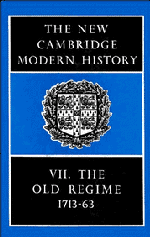Book contents
- Frontmatter
- CHAPTER I INTRODUCTORY SUMMARY
- CHAPTER II THE GROWTH OF OVERSEAS COMMERCE AND EUROPEAN MANUFACTURE
- CHAPTER III THE SOCIAL CLASSES AND THE FOUNDATIONS OF THE STATES
- CHAPTER IV THE VISUAL ARTS AND IMAGINATIVE LITERATURE
- CHAPTER V THE ENLIGHTENMENT
- CHAPTER VI RELIGION
- CHAPTER VII MONARCHY AND ADMINISTRATION
- CHAPTER VIII THE ARMED FORCES AND THE ART OF WAR
- CHAPTER IX INTERNATIONAL RELATIONS
- CHAPTER X THE DECLINE OF DIVINE-RIGHT MONARCHY IN FRANCE
- CHAPTER XI ENGLAND
- CHAPTER XII THE WESTERN MEDITERRANEAN AND ITALY
- CHAPTER XIII THE ORGANISATION AND RISE OF PRUSSIA
- CHAPTER XIV RUSSIA
- CHAPTER XV SCANDINAVIA AND THE BALTIC
- CHAPTER XVI POLAND UNDER THE SAXON KINGS
- CHAPTER XVII THE HABSBURG DOMINIONS
- CHAPTER XVIII THE WAR OF THE AUSTRIAN SUCCESSION
- CHAPTER XIX THE DIPLOMATIC REVOLUTION
- CHAPTER XX THE SEVEN YEARS WAR
- CHAPTER XXI THE DEVELOPMENT OF THE AMERICAN COMMUNITIES
- CHAPTER XXII RIVALRIES IN AMERICA
- CHAPTER XXIII RIVALRIES IN INDIA
- CHAPTER XXIV ECONOMIC RELATIONS IN AFRICA AND THE FAR EAST
- References
CHAPTER XIII - THE ORGANISATION AND RISE OF PRUSSIA
Published online by Cambridge University Press: 28 March 2008
- Frontmatter
- CHAPTER I INTRODUCTORY SUMMARY
- CHAPTER II THE GROWTH OF OVERSEAS COMMERCE AND EUROPEAN MANUFACTURE
- CHAPTER III THE SOCIAL CLASSES AND THE FOUNDATIONS OF THE STATES
- CHAPTER IV THE VISUAL ARTS AND IMAGINATIVE LITERATURE
- CHAPTER V THE ENLIGHTENMENT
- CHAPTER VI RELIGION
- CHAPTER VII MONARCHY AND ADMINISTRATION
- CHAPTER VIII THE ARMED FORCES AND THE ART OF WAR
- CHAPTER IX INTERNATIONAL RELATIONS
- CHAPTER X THE DECLINE OF DIVINE-RIGHT MONARCHY IN FRANCE
- CHAPTER XI ENGLAND
- CHAPTER XII THE WESTERN MEDITERRANEAN AND ITALY
- CHAPTER XIII THE ORGANISATION AND RISE OF PRUSSIA
- CHAPTER XIV RUSSIA
- CHAPTER XV SCANDINAVIA AND THE BALTIC
- CHAPTER XVI POLAND UNDER THE SAXON KINGS
- CHAPTER XVII THE HABSBURG DOMINIONS
- CHAPTER XVIII THE WAR OF THE AUSTRIAN SUCCESSION
- CHAPTER XIX THE DIPLOMATIC REVOLUTION
- CHAPTER XX THE SEVEN YEARS WAR
- CHAPTER XXI THE DEVELOPMENT OF THE AMERICAN COMMUNITIES
- CHAPTER XXII RIVALRIES IN AMERICA
- CHAPTER XXIII RIVALRIES IN INDIA
- CHAPTER XXIV ECONOMIC RELATIONS IN AFRICA AND THE FAR EAST
- References
Summary
Between 1640 and 1786 four generations of Hohenzollern rulers transformed Prussia from a collection of scattered and loosely combined provinces into a European Power. The labours of Ranke, and of the German scholars who continued his work in the Prussian State archives, particularly Schmoller, Hintze and Hartung, have left us in little doubt as to ‘how things really were’ in the field of internal administration in this century and a half, and the evidence can readily be checked in the well-edited volumes of the Acta Borussica. About the personalities of the Great Elector, King Frederick William I and Frederick the Great, and their claims to the admiration and imitation of later generations, the views expressed by historians have naturally been as various as their political backgrounds and ethical convictions, but it is generally agreed that among the presuppositions governing the actions of these monarchs three were never questioned: that kingship is a sacred trust, that authoritarianism is the only rational form of government and that its primary aim is the increase of the power of the State. ‘The happiness of the king's subjects does indeed appear alongside power [in the political testament of Frederick the Great], but the spirit which governs the whole system is that of power politics, not welfare legislation.’
To appreciate the achievements of the Prussian rulers we must remember what they started from in 1713. Brandenburg-Prussia was then one of the many composite ‘territories’ which, along with many smaller and some very small States, went to make up the ramshackle Holy Roman Empire.
- Type
- Chapter
- Information
- The New Cambridge Modern History , pp. 292 - 317Publisher: Cambridge University PressPrint publication year: 1957
References
- 1
- Cited by



